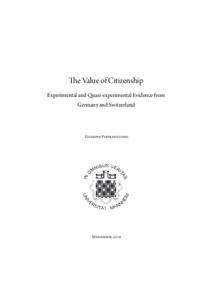|
The value of citizenship : experimental and quasi-experimental evidence from Germany and Switzerland
Pietrantuono, Giuseppe
![[img]](https://madoc.bib.uni-mannheim.de/41290/1.hassmallThumbnailVersion/dissertation_pflichtexemplare.pdf)  Vorschau |
|
PDF
dissertation_pflichtexemplare.pdf
- Veröffentlichte Version
Download (3MB)
|
|
URL:
|
https://madoc.bib.uni-mannheim.de/41290
|
|
URN:
|
urn:nbn:de:bsz:180-madoc-412902
|
|
Dokumenttyp:
|
Dissertation
|
|
Erscheinungsjahr:
|
2016
|
|
Ort der Veröffentlichung:
|
Mannheim
|
|
Hochschule:
|
Universität Mannheim
|
|
Gutachter:
|
Gautschi, Thomas
|
|
Datum der mündl. Prüfung:
|
1 Juni 2016
|
|
Sprache der Veröffentlichung:
|
Englisch
|
|
Einrichtung:
|
Fakultät für Sozialwissenschaften > Sociological Methodology (Gautschi 2009-)
|
|
Fachgebiet:
|
300 Sozialwissenschaften, Soziologie, Anthropologie
|
|
Normierte Schlagwörter (SWD):
|
Staatsbürgerschaft , Migration , Integration , Diskriminierung
|
|
Freie Schlagwörter (Englisch):
|
Citizenship , immigration , integration , natural experiment , field experiment , discrimination
|
|
Abstract:
|
Immigration is a long-simmering issue in every western democracy, and one of the most controversial aspects of immigration policy is the naturalization of immigrants. Citizenship is often tied to important rights, and right-wing political parties have extensively mobilized throughout Europe and the USA for restricting the influx of immigrants and more restrictive naturalization laws in recent years. These policy debates are likely to grow fiercer in the future. In their innovative research, Hangartner and Hainmueller (2013, forthcoming) extensively study the driving forces behind anti-immigrant sentiments in Switzerland by examining how naturalization rates vary at the local level. Building on their work my dissertation project examines another important aspect that has received almost no scholarly attention so far: the effect of naturalization on the lives of immigrants. What happens when immigrants are naturalized? Do immigrants become more politically active and engaged in their communities? Are they socially better integrated? Does citizenship lead to better labor market outcomes, and if so, through which channels does citizenship operate? Answering these questions is crucial to inform ongoing policy debates, but existing research has not provided any reliable micro-level evidence so far.
The key problem in studying the causal effect of citizenship is selection bias. Immigrants selectively apply for citizenship for reasons that are not observed by the researcher. Hence, non-naturalized immigrants and naturalized immigrants differ on a wide range of background characteristics that can potentially explain any differences in their social, political, and economic outcomes. This dissertation, for the first time, isolates the causal effect of citizenship per se by adopting (quasi-)experimental identification strategies, which allows me to obtain unbiased estimates of the effect of citizenship that are as credible as those obtained from a randomized experiment.
|
 | Dieser Eintrag ist Teil der Universitätsbibliographie. |
 | Das Dokument wird vom Publikationsserver der Universitätsbibliothek Mannheim bereitgestellt. |
 Suche Autoren in Suche Autoren in
Sie haben einen Fehler gefunden? Teilen Sie uns Ihren Korrekturwunsch bitte hier mit: E-Mail
Actions (login required)
 |
Eintrag anzeigen |
|
|
